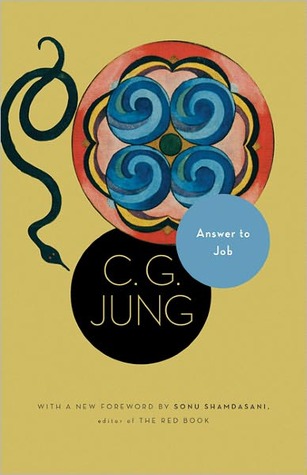Answer to Job

Carl G Jung
But what does man possess that God does not have? Because of his littleness, puniness, and defencelessness against the Almighty, he possesses, as we have already suggested, a somewhat keener consciousness based on self-reflection: he must, in order to survive, always be mindful of his impotence. God has no need of this circumspection, for nowhere does he come up against an insuperable obstacle that would force him to hesitate and hence make him reflect on himself. (13)
The therapeutic value of unresisting acceptance had proved its value yet again. (21)
All these trees have from ancient times been symbols of the Semitic love- and mother-goddess. (26)
Whoever God knows has an effect on him. The failure of the attempt to corrupt Job has changed Yahweh’s nature. (29)
While unconscious creation–animals, plants, and crystals–functions satisfactorily so far as we know, things are constantly going wrong with man. (32)
Perfection is a masculine desideratum, while woman inclines by nature to completeness. And it is a fact that, even today, a man can stand a relative state of perfection much better and for a longer period than a woman, while as a rule it does not agree with women and may even be dangerous for them. If a woman strives for perfection she forgets the complementary role of completeness, which, though imperfect by itself, forms the necessary counterpart to perfection. For, just as completeness is always imperfect, so perfection is always incomplete, and therefore represents a final state which is hopelessly sterile. “Ex perfecto nihil fit,” say the old masters, whereas the imperfectum carries within it the seeds of its own improvement. Perfectionism always ends in a blind alley, while completeness by itself lacks selective values. (33)
The lack of Eros, of relationship to values, is painfully apparent in the Book of Job: the paragon of all creation is not a man but a monster! (33)
And just as Adam was believed to be originally hermaphroditic, so “the woman and her seed” are thought of as a human pair, as the Queen of Heaven and Mother of God and as the divine son who has no human father. (36)
This arrangement, though it had the effect of exalting Mary’s personality in the masculine sense by bringing it closer to the perfection of Christ, was at the same time injurious to the feminine principle of imperfection or completeness, since this was reduced by the perfectionizing tendency to the little bit of imperfection that still distinguishes Mary from Christ. Phoebo propior lumina perdit! Thus the more the feminine ideal is bent in the direction of the masculine, the more woman loses her power to compensate the masculine striving for perfection, and a typically masculine, ideal state arises which, as we shall see, is threatened with an enantiodromia. No path leads beyond perfection into the future–there is only a turning back, a collapse of the ideal, which could easily have been avoided by paying attention to the feminine ideal of completeness. (37)
As always when an external event touches on some unconscious knowledge, this knowledge can reach consciousness. The event is recognized as déjá vu, and one remembers a pre=existent knowledge about it. (43)
If one knows that one has been singled out by divine choice (45) and intention from the beginning of the world, then one feels lifted beyond the transitoriness and meaninglessness of ordinary human existence and transported to a new state of dignity and importance, like one who has a part in the divine world drama. In this way man is brought nearer to God, and this is in entire accord with the meaning of the message in the gospels. (46)
But myth is not fiction: it consists of facts that are continually repeated and can be observed over and over again. It is something that happens to man, and men have mythical fates just as much as the Greek heroes do… I would even go so far as to say that the mythical character of a life is just what expresses its universal human validity. (47)
It is, unfortunately, a common experience that particularly positive and categorical assertions are met with wherever there is a slight doubt in the background that has to be stifled. (49)
Once again we are appalled by the incongruous attitude of the world creator towards his creatures, who to his chagrin never behave according to his expectations. (53)
By engendering insoluble conflicts and consequently an afflictio animae, it brings man nearer to a knowledge of God. All opposites are of God, therefore man must bend to this burden; and in doing so he finds that God in his “oppositeness” has taken possession of him, incarnated himself in him. He becomes a vessel filled with divine conflict. (54)
The torrent of negative feelings seems to be inexhaustible, and the dire events continue their course. Out of the sea come monsters “with horns” (i.e., endowed with power), the horrid progeny of the deep. Faced with all this darkness and destruction, man’s terrified consciousness quite understandably looks round for a mountain of refuge, an island of peace and safety. (82)
The Whore is the chthonic equivalent of the sun-woman Sophia, with, however, a reversal in moral character. If the elect turn themselves into “virgins” in honor of the Great Mother Sophia, a gruesome fantasy of fornication is spawned in the unconscious by way of compensation. (84)
